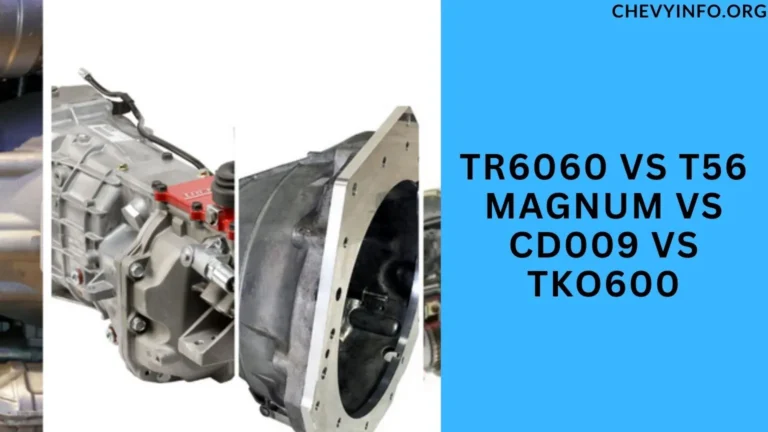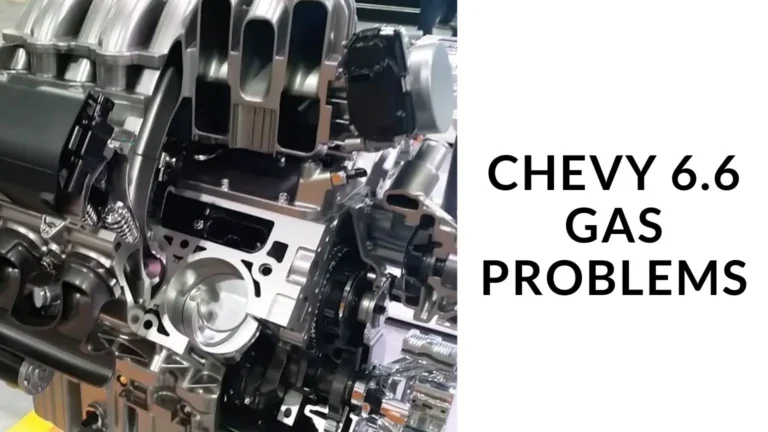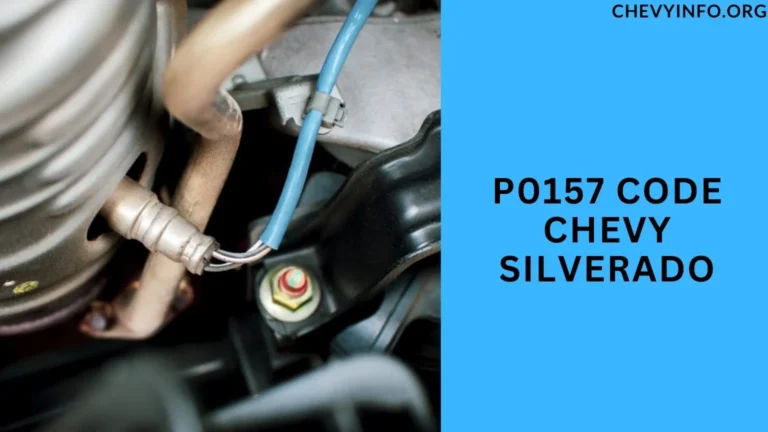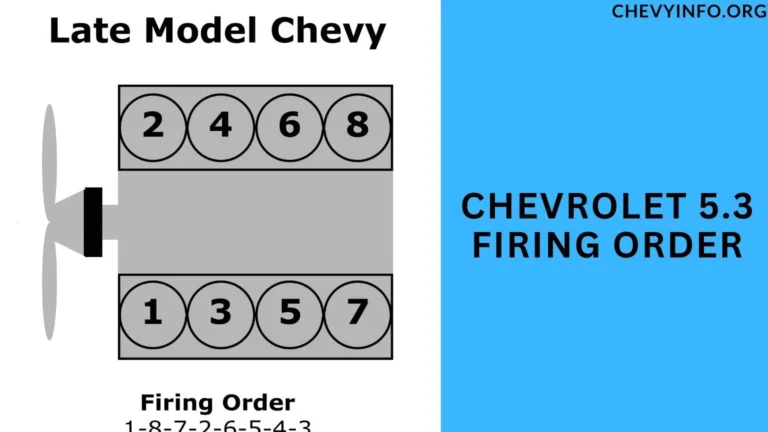L99 VS LS3 VS LS7: Which Is The Best Engine? of 2024
When it comes to high-performance engines, a few names stand out like the L99, LS3, and LS7. These engines have become synonymous with power, reliability, and versatility in the automotive world.
Whether you’re a gearhead looking to upgrade your vehicle or simply curious about these powerhouse engines,
understanding their differences and capabilities is crucial. In this article, we delve deep into the L99 vs LS3 vs LS7 debate to help you make an informed decision.
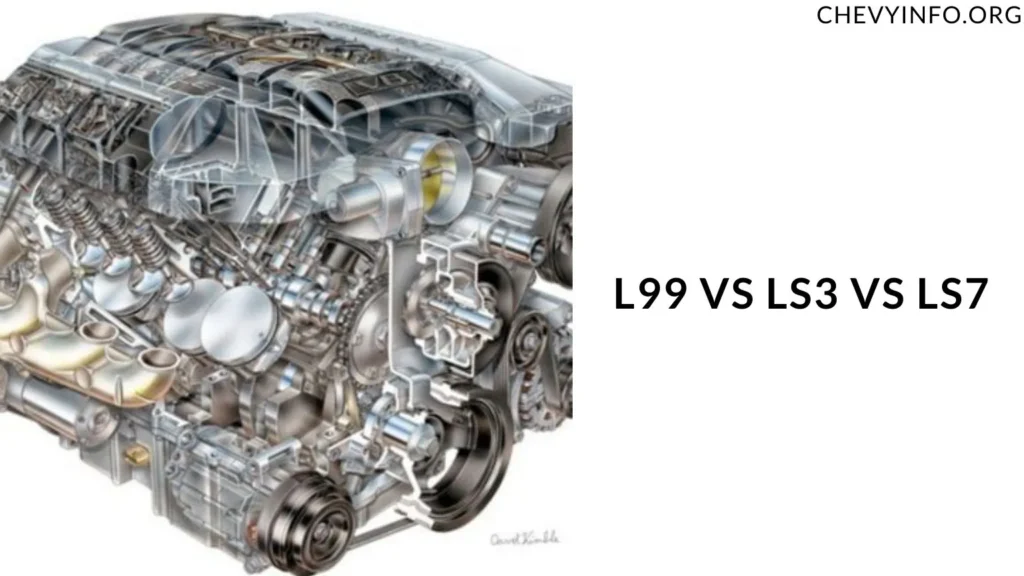
Introduction to L99 VS LS3 VS LS7 Engines
In the world of high-performance engines, the L99, LS3, and LS7 are iconic names that have left a lasting impression on automotive enthusiasts and professionals alike.
These engines, developed by General Motors (GM), belong to the esteemed small-block V8 engine family, known for their power, reliability, and versatility.
Let’s delve into the fascinating world of these engines, exploring their histories, key features, and applications in various vehicles.
Brief History and Development
The L99, LS3, and LS7 engines are part of General Motors’ legendary small-block V8 engine family.
The lineage traces back to the iconic Chevrolet small-block introduced in the 1950s, known for its compact size, lightweight design, and impressive power output.
Over the decades, GM has refined and enhanced these engines, culminating in the modern L99, LS3, and LS7 variants.
Key Features and Specifications
Each engine brings its unique set of features and specifications to the table:
- L99: Known for its smooth power delivery and excellent low-end torque, the L99 is often found in luxury and performance-oriented vehicles. It utilizes technologies like Active Fuel Management (AFM) to improve fuel efficiency without compromising performance.
- LS3: Renowned for its high-revving capabilities and robust power output, the LS3 is a favorite among enthusiasts and sports car manufacturers. With its larger displacement and advanced components, the LS3 delivers exhilarating performance on both the street and the track.
- LS7: The LS7 is a true powerhouse, designed for maximum performance in high-performance vehicles and racing applications. It features a large displacement, high compression ratio, and race-inspired components like titanium connecting rods and intake valves.
Comparison of Technical Specifications
let’s compare the technical specifications of the L99, LS3, and LS7 engines across various parameters:
Power Output and Torque
- L99: Approximately 400 horsepower and 410 lb-ft of torque
- LS3: Around 430 horsepower and 425 lb-ft of torque
- LS7: Up to 505 horsepower and 470 lb-ft of torque
Displacement and Compression Ratio
- L99: 6.2L displacement with a compression ratio of around 10.7:1
- LS3: 6.2L displacement with a compression ratio of approximately 10.7:1
- LS7: 7.0L displacement with a high compression ratio of 11.0:1
Fuel Delivery System
- L99: Sequential fuel injection system for precise fuel delivery
- LS3: Electronic fuel injection system with advanced engine management
- LS7: High-flow fuel injectors and optimized fuel delivery for maximum performance
Cooling System
- L99: Efficient cooling system with integrated oil cooling capabilities
- LS3: Enhanced cooling system for high-performance applications
- LS7: Upgraded cooling system with larger radiators and oil coolers
Transmission Compatibility
- L99: Compatible with both automatic and manual transmissions
- LS3: Ideal for manual transmissions but also works well with automatics
- LS7: Primarily designed for manual transmissions due to its high-performance nature
Performance Differences and Applications
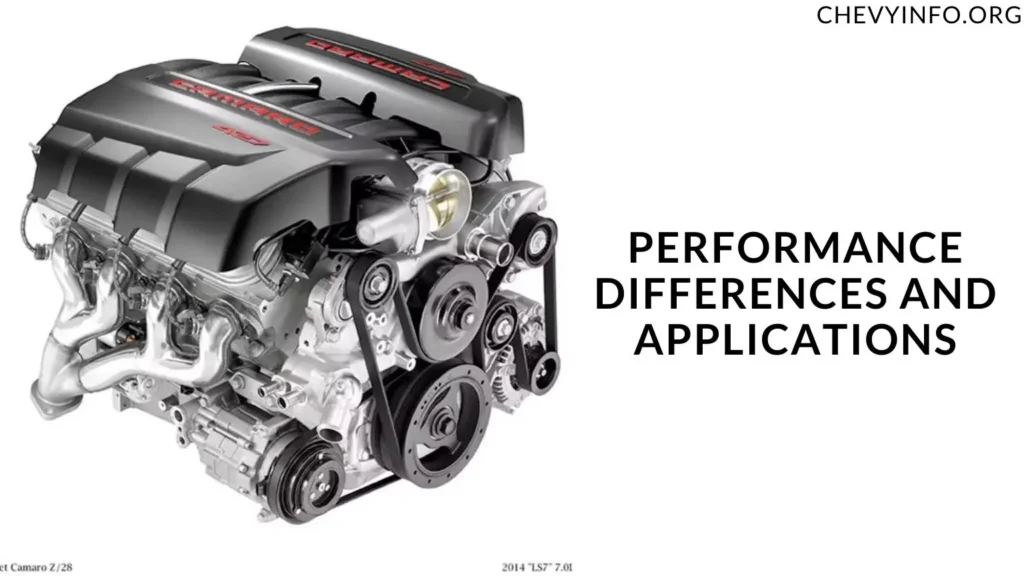
Let’s delve into the performance differences and applications of the L99, LS3, and LS7 engines:
Street Performance
The L99 offers a balanced blend of power and refinement, making it suitable for daily driving and spirited acceleration. Its torque delivery ensures responsive performance in various driving conditions.
The LS3 shines on the streets with its impressive horsepower figures and smooth power delivery.
It excels in sports and muscle cars, providing exhilarating acceleration and a thrilling driving experience.
The LS7 delivers unmatched power and precision for those seeking uncompromising street performance.
It’s often found in high-performance supercars and track-focused vehicles, offering blistering acceleration and corner-carving capabilities.
Track Performance
While capable on the track, the L99 is more geared toward street applications due to its focus on low-end torque and drivability. However, with the right modifications, it can still deliver respectable track performance.
The LS3 is a favorite among track enthusiasts, thanks to its high-revving nature and ample power reserves.
It provides excellent straight-line speed and cornering prowess, making it a versatile choice for track days.
For serious track enthusiasts and professional racing teams, the LS7 is the ultimate choice. Its massive power output, lightweight design, and race-ready components ensure unparalleled performance on the track.
Customization and Aftermarket Support
All three engines benefit from extensive aftermarket support, allowing owners to customize and enhance performance according to their preferences.
From bolt-on upgrades to full-engine builds, enthusiasts have a plethora of options to unleash more power and improve overall performance.
Design and Components
The design and components of an engine play a crucial role in determining its performance, efficiency, and overall characteristics.
Let’s delve into the specific design aspects and components that differentiate the L99, LS3, and LS7 engines:
L99 Engine Design
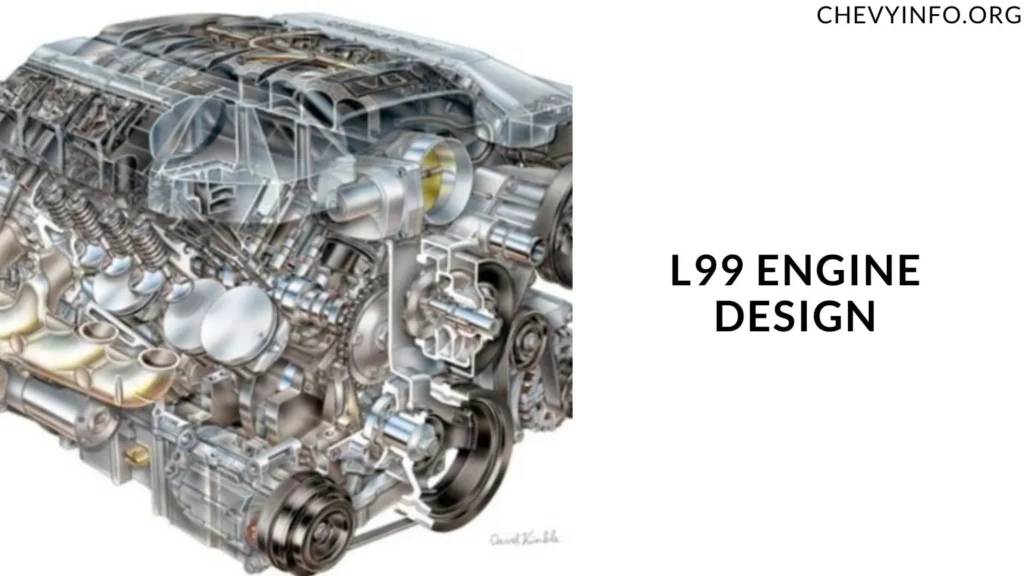
The L99 engine incorporates advanced technologies such as variable valve timing (VVT) and cylinder deactivation for enhanced efficiency and performance.
Its design focuses on achieving a balance between power output and fuel efficiency, catering to a broader range of drivers.
LS3 Engine Design
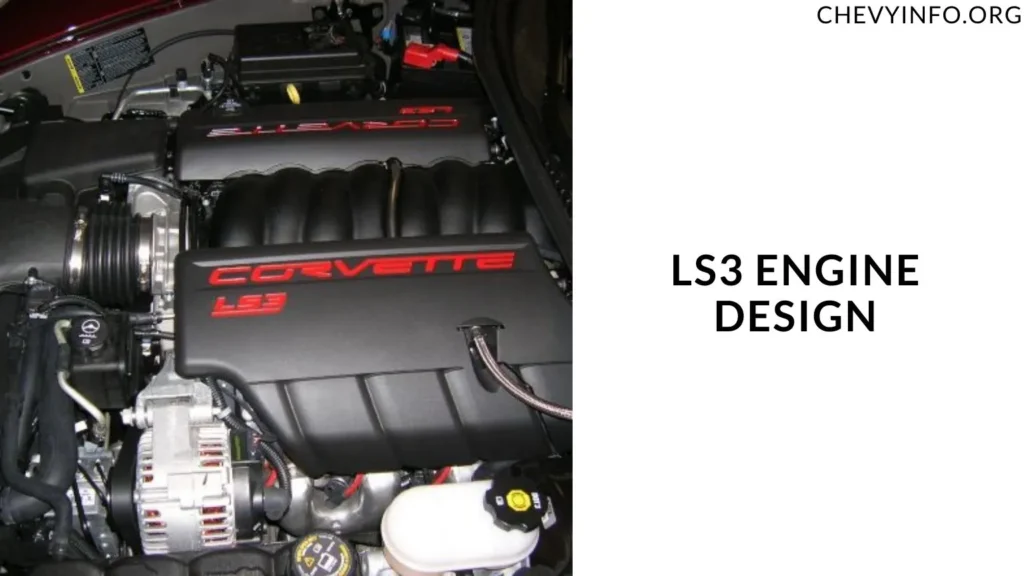
Similar to the L99, the LS3 engine features VVT technology but is optimized for higher performance levels.
Its design includes robust components and efficient airflow management, contributing to its impressive power delivery and overall engine responsiveness.
LS7 Engine Design
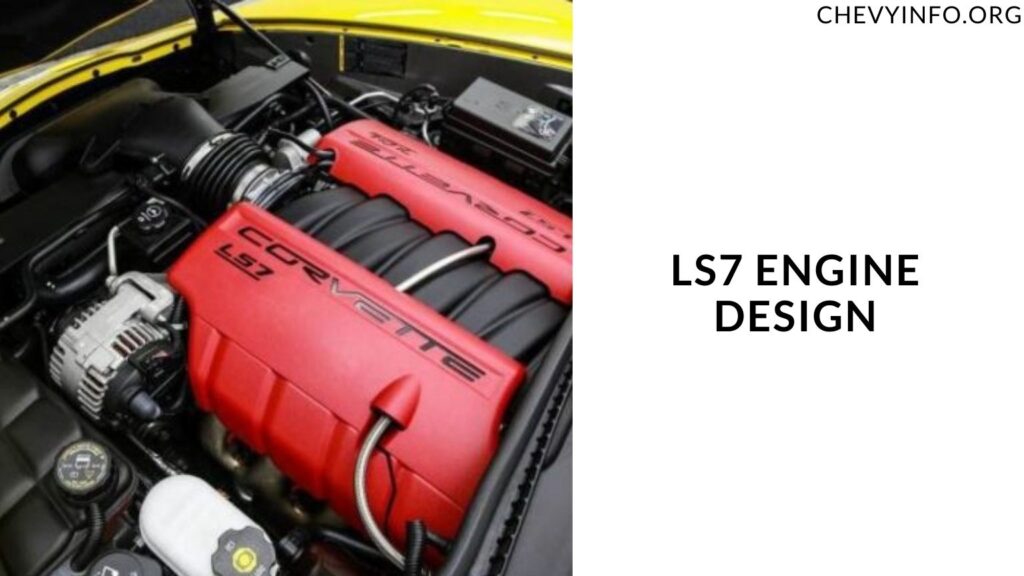
The LS7 engine represents the pinnacle of GM’s V8 engineering, featuring a lightweight yet durable construction, forged internals, and high-flow cylinder heads.
These design elements are geared towards maximizing performance and durability, making the LS7 a favored choice for racing applications.
Cost and Availability
When considering engine options like the L99, LS3, and LS7, factors such as cost and availability play a significant role in decision-making.
Let’s explore the approximate costs and availability of these engines in the automotive market:
L99 Engine Cost and Availability
The L99 engine, commonly utilized in modern Chevrolet vehicles, is relatively accessible and cost-effective compared to its counterparts.
On average, the L99 engine is priced at around $7,000, making it a viable option for enthusiasts and builders seeking a balance between performance and affordability.
Moreover, due to its widespread use in Chevrolet models, finding L99 engines in the market is relatively straightforward, enhancing its availability for potential buyers.
LS3 Engine Cost and Availability
The LS3 engine, renowned for its performance-oriented characteristics, commands a moderate price range in the automotive market.
With an average cost of approximately $6,500, the LS3 engine offers a compelling combination of power and affordability, making it a popular choice among enthusiasts looking to upgrade or modify their vehicles.
Additionally, the LS3 engine enjoys good availability, thanks to its use in various high-performance Chevrolet models and aftermarket support.
LS7 Engine Cost and Availability
Among the three engine variants, the LS7 engine stands out as the pinnacle of performance, albeit at a higher price point.
The LS7 engine’s cost typically ranges around $12,700, reflecting its advanced design, superior power output, and limited availability in the market.
Due to its specialized nature and track-focused attributes, the LS7 engine may be less commonly found compared to the L99 and LS3 variants.
However, for enthusiasts and professionals seeking uncompromising performance, the LS7 remains a coveted choice despite its higher cost and potential availability challenges.
Pros and Cons of Each Engine
Advantages of L99
- Excellent low-end torque for smooth acceleration
- Fuel-efficient, thanks to technologies like Active Fuel Management
- Suitable for daily driving and commuting
Advantages of LS3
- High-revving capabilities for thrilling performance
- Balanced power delivery for both street and track use
- Extensive aftermarket support for customization
Advantages of LS7
- Incredible power output for track dominance
- Lightweight design with race-inspired components
- Exceptional cooling and durability under high loads
Limitations of Each Engine
- L99: Limited top-end power compared to LS3 and LS7
- LS3: Can be fuel-thirsty under aggressive driving conditions
- LS7: Higher initial cost and maintenance expenses
User Experiences and Testimonials
Owners of vehicles powered by these engines often share their experiences and feedback:
- “The L99 offers a great balance of power and efficiency, perfect for daily driving without sacrificing performance.”
- “The LS3’s high-revving nature never gets old; it’s a joy to push it to its limits on the track.”
- “The LS7 is a beast on the track; its power delivery is addictive, and it handles like a dream.”
People also ask
Is the L99 or LS3 faster?
The LS3 engine is generally faster than the L99 engine due to its higher horsepower and torque output, optimized for performance-oriented driving experiences.
Is the LS7 better than the LS3?
Yes, the LS7 engine is considered better than the LS3 due to its higher performance capabilities, including significantly increased power output and specialized design for track-focused applications.
How do I know if I have LS3 or L99?
You can typically identify whether your engine is an LS3 or L99 by checking the vehicle’s VIN (Vehicle Identification Number) or referring to the engine code stamped on the engine block.
The eighth character in the VIN or the engine code will indicate the specific engine variant.
What is the difference between ls2 and L99?
The main difference between the LS2 and L99 engines lies in their design and application.
The LS2 is an older generation engine with a larger displacement and higher horsepower compared to the L99.
The L99, on the other hand, incorporates newer technologies such as cylinder deactivation for improved fuel efficiency, making it suitable for modern vehicles.
Conclusion on Choosing the Right Engine
In conclusion, the comparison between the L99, LS3, and LS7 engines highlights their unique attributes and suitability for different applications.
While the L99 excels in balancing performance and efficiency for daily driving, the LS3 and LS7 engines cater to enthusiasts seeking uncompromising power and track-ready performance.
With a plethora of aftermarket support and modification options, these engines offer endless possibilities for customization and performance enhancement, ensuring an exhilarating driving experience for enthusiasts worldwide.

Henry Worner, a seasoned automotive expert with over 13 years of experience in car repair, maintenance, and performance enhancement, ChevyInfo.org was born out of a passion for Chevrolet vehicles. Henry’s deep-rooted love for everything Chevy has driven him to create a platform where fellow enthusiasts, car owners, and anyone interested in Chevy cars can find valuable insights, tips, and guidance.


